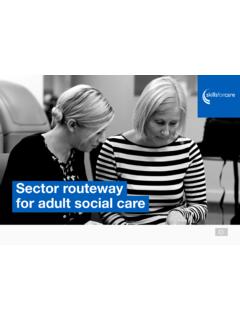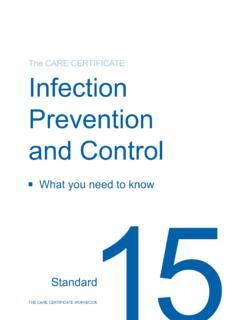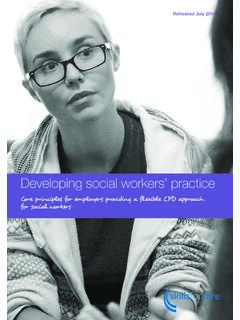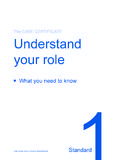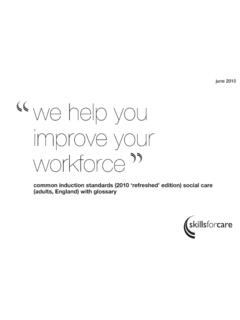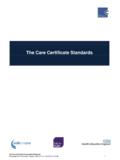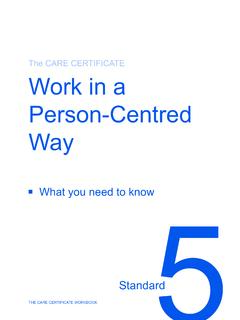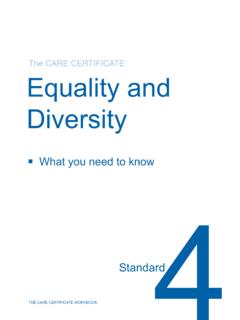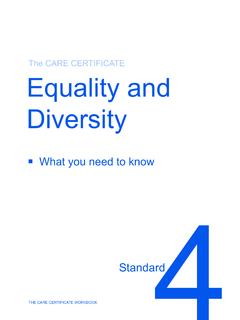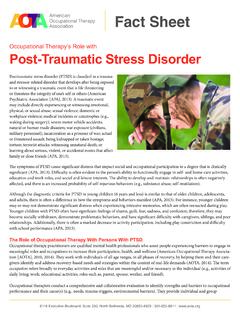Transcription of The CARE CERTIFICATE Duty of Care
1 The CARE CERTIFICATE . Duty of Care What you need to know Standard THE CARE CERTIFICATE WORKBOOK. Duty of care You have a duty of care to all those receiving care and support in your workplace. This means promoting wellbeing and making sure that people are kept safe from harm, abuse and injury. Duty of care is a legal requirement; you cannot choose whether to accept it. It applies as soon as someone has care or treatment. Breaking this duty, for example through negligence, could result in legal action. Wellbeing Code of conduct Wellbeing could be defined as the The code of conduct tells you how positive way in which a person feels you are expected to behave as a care and thinks of themselves. worker. The duty of care is also to other workers, for example, in a hospital, to doctors, nurses and healthcare support workers but also to caterers, cleaners and maintenance workers.
2 If you are a home care worker you will often work alone in a variety of homes. Your duty of care is to each individual and to the other workers you come into contact with in the community. The duty of care is part of the code of conduct for healthcare support workers and adult social care workers in England and will most likely also be in your job description. It is important that you have the knowledge and skills to act on your duty of care in your role but that you don't work beyond it. As part of your duty of care you should pass on any concerns you have about wellbeing. Every employer has agreed ways of working to respond to possible harmful situations which will include how to report any concerns. Concerns could be about anything from poor working conditions or equipment to untrained workers, as well as suspected abuse.
3 In any situation, if you do not know what you should do, ask your manager. If you are working for a very small employer, ways of working may be passed on to you in a discussion. Providing guidance about how to deal with abuse and violence or substance misuse or how to handle toxic substances or carry out risk assessments are all part of making sure that the duty of care is carried out. Fire drills, agreed ways of handling medication as well as cooking and food storage are some of the routine ways that make sure that the duty of care is in place and will depend on your workplace. THE CARE CERTIFICATE WORKBOOK STANDARD 3. 1. Supporting independence The code of conduct says that you must work in ways that respect and protect the individual's rights, including their right to live as independently as possible, to make their own choices and to take risks.
4 There may be times when they make choices that you think are unwise, unsafe or that you disagree with. For example when someone with a disability wants to try a new physical activity or when someone chooses not to eat less fatty foods. You should make sure that they have as much information as possible about their choices and what could happen. If they still choose to make a risky choice a risk assessment may identify ways in which risks can be reduced and the individual can be supported to make those decisions. Your employer will give you guidance on risk assessments, risk enablement and health and safety. Whatever you come across you have to consider the individual's wellbeing as your main priority. If you are unsure about any situation, ask your manager. Other sources of support might be the individual's friends or family, a befriender or an advocate, their GP or another care worker.
5 You will look at issues around mental capacity, mental health, dementia and learning disabilities in more detail in standard 9. Advocate An advocate is a trusted, independent person who can speak and act for the individual. They can advise on matters such as benefits and can ensure that the individual's voice is heard in care planning meetings making sure that decisions are made in the interests of the individual. The role of advocates and advocacy services will become more important when the Care Act becomes law. Individuals make decisions all the time and should be supported to do so. Sometimes an individual may not be able to understand and retain the information they need to make a decision or communicate their choice. If this is the case they may lack the mental capacity to make the decision. They may be able to make day-to-day decisions for example what to wear and what they want to eat, but not able to make decisions about money or medical issues.
6 In situations where you are not entirely sure about the individuals capacity, please seek additional advice or guidance. Comments and complaints You have a duty to make sure that individuals know that they have a right to complain or comment about their care or support. It is important that this is able to happen quickly and in a positive way. They should be taken seriously and explored so that any learning can be used to keep doing the right things or to make improvements. Positive comments can be encouraging and used to show how good ways of working are making a positive difference. Ask your employer to tell you about what to do when someone wants to complain or comment. THE CARE CERTIFICATE WORKBOOK STANDARD 3. 2. The Local Authority Social Services and NHS Complaints (England) Regulations 2009. is the legislation for complaints in health and social care.
7 The Department of Health also published the NHS Constitution in 2011, which tells you about guiding principles and patients' rights. There should be a recorded process to follow which may differ depending on the type of workplace and have a time limit in which the complaint has to be made after the situation happened. If someone wants to make a comment or complaint you should deal with it in line with your organisations agreed ways of working. Depending where you work, that could include: Arrange to talk in private Make sure the individual knows that you may need to pass on information if there is a risk to the safety of themselves or others Listen calmly and actively, assuring them that you are taking them seriously Do not judge or become emotional Offer your support but do not try to answer at this stage Explain what will happen next, who the complaint will be passed to and when they will get some feedback.
8 Thank them, tell your manager what has been said, and make a record as soon as possible. Often an organisation has one named person who deals with complaints. Depending on the size of the organisation there may be a complaints section such as the NHS's Patient Advice and Liaison Service (PALS). Your workplace also needs to identify a responsible person' who will be the person that holds the role of accountable officer. Smaller workplaces might not have anything in writing but will still have agreed ways of working when complaints are made. Incidents, errors and near misses Sadly, having the best ways of working, the code of conduct and the duty of care, doesn't always protect vulnerable adults from harm. All health and social care workplaces involve workers collaborating towards the wellbeing of those needing care or support.
9 Mistakes happen through things like lack of knowledge, poor communication or not sharing information, stress, negligence or being distracted. Mistakes are seen as being one of the following: Adverse events: Errors: Near misses: action or lack of not doing something situations where an action that leads as it should have been action could have harmed to unexpected, done, for example the individual but, either unintended and through bad planning by chance or purpose, preventable harm. or being forgetful. was prevented. Incidents: specific negative events. In health and social care serious incidents are described as events which need investigation as they caused severe harm or damage to either the person receiving care or the organisation. THE CARE CERTIFICATE WORKBOOK STANDARD 3. 3. The first thing to do after something has gone wrong is to do what you can to improve the wellbeing and meet the immediate needs of the individuals involved.
10 Your workplace will have a form which you should complete to record incidents, accidents and near misses. You should record the date, time and facts. This is used to make your manager aware straight away. Do not blame other workers or suggest why the incident might have happened to those involved even if you have an idea why it was. If your thoughts turned out to be wrong you could lose the individual's and family's trust and respect. Legislation For health and social care work a number of legislations set standards on how to handle Care and compassion Think clearly and carefully about the potential reasons for someone's distress. Use your person centred approach and knowledge of them as an individual, as you may be able to de-escalate a challenging situation by recognising their unmet needs and responding to these with supportive care and/or additional services.
